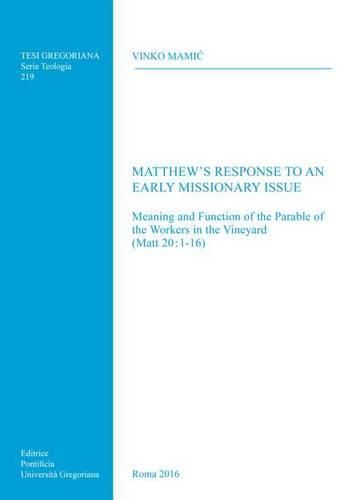Readings Newsletter
Become a Readings Member to make your shopping experience even easier.
Sign in or sign up for free!
You’re not far away from qualifying for FREE standard shipping within Australia
You’ve qualified for FREE standard shipping within Australia
The cart is loading…






From a methodological perspective, this paper examines both the rethorical and referential dimension of elaborated biblical text. Focusing on the former, it principally applies reader-response criticism. Parabolic speech in intended to initially involve the reader in the fictional story, making him or her receptive to its inherent logic and moral consequences. Secondly, it is intended to disclose the realities of the real world to which it refers. The communicative character of this speech is such as to provide the practicing members of a Christian community with a deeper understanding of God’s Kingdom, while those who are not receptive to the gospel message are deprived from knowing its mysteries. The parable of the Workers in the Vineyard is examined in its literal and its historical context. This survey shows that the Parable does not refer, as usually suggested, to an eschatological but to the post-Easter period of time. It refers to a problem that was emerging among the early and later missionaries of the primitive Church in respect to their reward in the present time. The former should not claim to have more than the latter: all are equally to have what is necessary to cover their essential needs. The parable’s rhetorical function is to provoke a change in the early missionaries’ standpoint.
$9.00 standard shipping within Australia
FREE standard shipping within Australia for orders over $100.00
Express & International shipping calculated at checkout
From a methodological perspective, this paper examines both the rethorical and referential dimension of elaborated biblical text. Focusing on the former, it principally applies reader-response criticism. Parabolic speech in intended to initially involve the reader in the fictional story, making him or her receptive to its inherent logic and moral consequences. Secondly, it is intended to disclose the realities of the real world to which it refers. The communicative character of this speech is such as to provide the practicing members of a Christian community with a deeper understanding of God’s Kingdom, while those who are not receptive to the gospel message are deprived from knowing its mysteries. The parable of the Workers in the Vineyard is examined in its literal and its historical context. This survey shows that the Parable does not refer, as usually suggested, to an eschatological but to the post-Easter period of time. It refers to a problem that was emerging among the early and later missionaries of the primitive Church in respect to their reward in the present time. The former should not claim to have more than the latter: all are equally to have what is necessary to cover their essential needs. The parable’s rhetorical function is to provoke a change in the early missionaries’ standpoint.